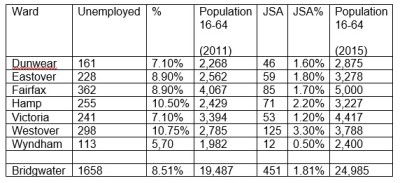
At this weeks meeting of Labour controlled Bridgwater Town Council, Cllr Mick Lerry (Victoria) presented a paper on Employment, Skills Training and Local Labour Agreements. The Town Council unanimously backed his recommendations after accepting an amendment from Cllr Diogo Rodrigues (Dunwear North) urging that any Apprenticeships should be ‘Quality’.
Cllr Lerry’s recommendations were ;
1 Support Local Labour Agreements through legal and planning negotiations.
2 Support the creation of more ‘Quality’ Apprenticeships, with the introduction of major projects and the Devolution prospectus or agenda.
3 Encourage employers to pay the real “Living Wage” and above.
4 Work with organisations such as Bridgwater Chamber of Commerce, Bridgwater College and other partners to expand skilled opportunities for Bridgwater people.
5 Discuss Skills Training with employers, trade unionist and organisations at the Bridgwater Town Forum.
Overview
Unemployment for the Bridgwater and West Somerset Constituency has fallen from 3400 level in January 2014 to 2700 level in September 2015, according to the Office for National Statistics. This represents a fall from 6.1% to 4.9% of the population. The employment rate for the District is running at 73.1%, which is just above the national average of 72.9%, with 0.2% long-term unemployed and 2.4% youth unemployment. Youth unemployment has fallen by half in the last year. The chart below shows the unemployment figures for Bridgwater in the year 2011 and 2015, for those people between 16 and 64 who are actively seeking work.
 Introduction
Introduction
The skills level at NVQ2 or equivalent 5 A*-C GCSEs has increased from 2013 to 2014 from 70.2% to 75.8%. According to the statistics the skill level in the workforce has increased by 16% since 2004. At the moment there are 5 Local Labour Agreements. Since 2014 50 individuals have been supported on a one to one basis on coaching, CV support and signposting of job opportunities. Of these people 20 have found full time or part time work and another 20 have signed up for Hinkley related work. Initial figures show that job opportunities are expected to double, due to the rise in construction.
In Bridgwater a number of outreach Skills Hubs have been created at the Victoria Park Community Centre, Sydenham Together Project and English tuition for speakers of other languages.
Skills Training
Apprenticeships the Facts

If you live in England and are over 16 you can apply for an apprenticeship. There are various levels of apprenticeship you can undertake depending on your current skills and qualifications:
• Intermediate apprenticeship (level 2)
• Advanced apprenticeship (level 3)
• Higher apprenticeship (levels 4-7)
• Degree apprenticeship (levels 6-7)
All apprenticeships are real jobs so all apprentices earn a salary. You must be paid at least the national minimum apprenticeship wage – and many employers pay significantly more. Apprentices should work for at least 30 hours per week and an apprenticeship takes between one and five years* to complete, depending upon the level of apprenticeship and the industry sector. Most of the training is delivered in the workplace, so you will learn the skills you need to do the job well. The rest of the training is given by a training organisation, either at the workplace, off-site (perhaps at college) or via e-learning. The training is specifically tailored to ensure you develop the skills the employer wants, giving apprentices a real advantage in the workplace. This means that apprentices not only have better long term salary prospects, but they also have excellent progression opportunities, whether looking to study further or climb the ranks within the workplace. If you are not quite ready for an apprenticeship, a traineeship might be for you. A traineeship is designed for young people who want to get a job and the skills and experience to boost their career prospects. A traineeship will provide the essential work experience, work preparation training, and English and maths support (if needed) to secure an apprenticeship or other employment.
Costs Involved

The Employer pays the apprentice a wage and the College or training provider tuition is covered as follows.
• Age 16-18: no charge as government funded.
• Age 19-23: the employer contributes to the apprentice’s tuition fees at the government this is capped at £500. For Intermediate and Advanced Apprenticeships there will be a 50% discount for Small and Medium Sized Enterprises (companies who employ less than 250 employees), but no discount for Higher Apprenticeships.
• Age 24+: if the apprentice is studying a Level 2 qualification, the employer is expected to contribute. At Level 3 and above, Advanced Learner Loans are available for learners who need help to fund their studies.
The government Skills Funding Agency is responsible for supporting employers who take on apprentices and all colleges, employers and training organisations that receive education and training funds from the Skills Funding Agency, must abide by the performance management rules. For many small employers this could be an onerous tasks and one that might stop them taking on apprentices if they are unable to meet the minimum standards.
At the moment the Government is pushing the greater take up of Advanced and Higher apprenticeships, which will include employees with degrees and in the last spending review announced that a Apprenticeship Levy will be taken from employers.

In the Bridgwater College Annual report for 2014/15 the number of apprentices on roll had reached 1,550 and of that group 88% had reached 88% at Level 3 for all advanced apprenticeships across the College. For Bridgwater people Bridgwater College is a lead organisation for Apprenticeships and the Bridgwater Chamber of Commerce will be holding an event for employers on Apprenticeships in March 2016.
A local recruitment agency has explained that already many workers are leaving local businesses and employers to seek higher wages at the Hinkley site, this will mean for some local businesses they will find difficulty in recruiting suitable employees to back fill these employment posts.
In fact there might be a role for the Local Authority to assist employers with the paperwork for Apprenticeships, as they have done in Leeds.
Local Labour Agreements
It has been reported that there are now 5 Local labour Agreements initiated by Sedgemoor District Council:
“In order to help improve local employment and training opportunities for local residents, Sedgemoor District Council adopted an ‘Employment and Skills Charter’ policy.
Summary

• Local Labour Agreements (LLAs) involve a commitment from employers or developers to sign up to the Employment and Skills Charter in order to commit to try and recruit and procure services locally.
• Where 10 or more jobs are proposed, through adopted planning policy the Council will seek to enter into an LLA secured through either a planning condition or legal agreement (S.106).
• Smaller employment developments do not need to have an LLA, although a voluntary written commitment (for example, within planning applications) to try to recruit and procure locally will be welcomed and encouraged.
Background
In order to help improve local employment and training opportunities for local residents, Sedgemoor District Council adopted an ‘Employment and Skills Charter’ policy in May 2009, now included under Policy D 11 of the LDF adopted Core Strategy (2011).
Under this policy, for employment developments that propose 10 or more jobs in total, the Council will seek to enter into a Local Labour Agreement with the Developer/ Applicant in accordance with the Council’s adopted Employment and Skills Charter that sets out the following:
• An agreed % target for local labour
• A training and recruitment plan and
• Commitment to an agreed proportion of local procurement of services and supplies.
In the case of very large developments, the Local Authority may request some degree of information sharing and monitoring of the above, for example, headline recruitment information on a quarterly basis. This will take the form of clause within a legal ‘Section 106’ agreement or be included as a planning condition.

For developments proposing less than 10 new jobs, no formal Local Labour Agreement is required, although adherence to the spirit of the Employment and Skills Charter (i.e. local recruitment, procurement and training where possible) is welcomed within any formal planning application made”.
Exeter City Council has followed the lead from Sedgemoor District Council and Eastbourne Council and information on Local Labour Agreements (LLAs) can be found on the SDC and Exeter City Council websites. Local Labour Agreements have also been introduced in other parts of Britain as community benefit for local people.
Bridgwater Town Council could support Local Labour Agreements in any future planning decisions and consultations with developers as a way of encouraging local training and job opportunities for Bridgwater people. It is also important for Trade Unions to be involved in the discussions with employers and developers regarding Local Labour Agreements on wages and terms and conditions and the possibility of apprenticeships.
Devolution
The Devolution agenda is looking at trying to obtain 4 Billion additional funding from Government to create 163K employment new jobs in Somerset and Devon, with apprenticeship starts increased by 400%. Plus increased wage levels above the national average. The outcome of these negotiations will not be finalised until possibly 2018/19.
